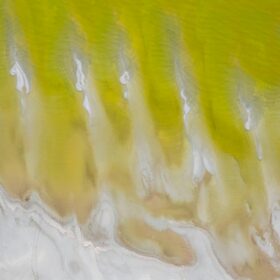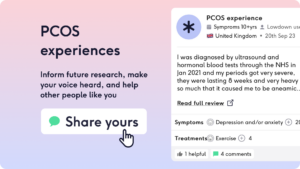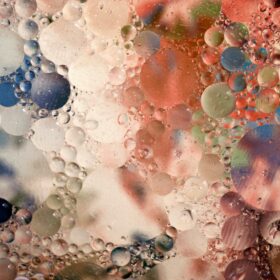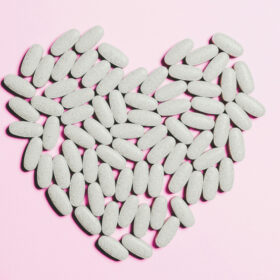
PCOS acne and how to treat it
Acne is a common feature of PCOS, affecting a huge number of people with the condition[1]. Let’s face it, it’s a frustrating symptom as acne is visible and can affect your self esteem and mental health. But don’t worry, there are treatments to manage acne, and The Lowdown is here to help.
What causes acne in people with PCOS?
Acne is a skin condition that is caused when glands in the skin called sebaceous glands make too much oil. This oil along with dead skin cells build up and block the pores in the skin causing blackheads. The extra oily environment is also a friendly place for a bacteria found on the skin to multiply causing red, inflamed and pus filled or cystic spots[2].
The sebaceous glands are controlled by hormones, and higher levels of androgens trigger the glands to make more oil. Androgens including testosterone are typically higher in PCOS, leading to acne.
Where is acne found in people with PCOS?
Acne is usually seen on the face, neck, back and upper chest. Research has found that PCOS acne may be found most commonly on the cheeks and forehead[1], but may also be found on the lower jawline where hormonal acne tends to flare.
What causes PCOS acne flare ups?
Flare ups are so annoying, just when you think you’re winning, out the spots come before a first date or fancy social event – you’re not alone. The most common cause of an acne flare is before a period (between 40-85% of us!)[3,4] Around this time, you may find your skin is more oily and prone to breakouts of spots. This is due to hormonal fluctuations and an increase in androgens before a period.
More research has been carried out looking at the risks for flares in those with adult female acne, not just PCOS acne. These studies suggest that stress can contribute to flares.[5,6]
You may also find yourself trapped in the cycle of covering up acne using cosmetics, which can then worsen flares, especially full cover foundation[6,7].
Diet is also important in flares – not eating your 5 a day of fruit and veg, eating too much greasy food and large amounts of dairy may worsen acne but higher quality research is needed.[7,8]
How to tell the difference between normal acne and PCOS acne?
Acne is exceptionally common, affecting 95% of people between the ages of 11 and 30[10]. You should suspect you have PCOS related acne if you develop other symptoms such as irregular or no periods, unwanted hair growth or difficulty getting pregnant. If acne is persisting over the age of 25, this is known as adult acne and PCOS is found in almost half of women with adult acne[9]. If you’re struggling with acne and are worried that PCOS could be the underlying cause, please speak to your healthcare provider about further tests to get a diagnosis.
Can PCOS acne be managed with diet?
The research into acne and diet isn’t fantastic but there is evidence that certain dietary changes can help. A review of all the research suggests that a diet of milk, chocolate and high glycaemic foods (carbohydrates that digest quickly like white bread and sugary foods) may worsen acne. Increasing your fruit, vegetables and foods that contain omega-3 such as oily fish may help[12]. There is also evidence that a lower carbohydrate diet[13], anti-inflammatory diet[14] and reducing refined sugar while concentrating on lean meats and vegetables improve PCOS symptoms overall[15]. Unfortunately, none of these studies have been large or continued for a long time to generate good quality data, but we suspect that an overall healthy diet is one factor to reduce PCOS symptoms including acne. We encourage healthy, gradual changes to your diet and lifestyle that are manageable and fit into your life.
How else can PCOS acne be managed?
Acne can be managed in loads of different ways from lifestyle and skin care changes to medications. Medicated creams and gels can be purchased from pharmacies or prescribed by your doctor.
Oral contraceptives are a treatment for both acne and PCOS – and our specialism at The Lowdown. There are various brands of combined contraceptive pill which may be better at improving the hormonal acne associated with PCOS. The progestogen contained in different pill brands can affect the androgen levels within the body. Many people with PCOS will have great results with the standard brand of pills such as Rigevidon, Ovranette or Microgynon. Others may find brands that contain a progestogen called drospirenone are better for acne, such as Yasmin, Eloine or Lucette.
Spironolactone is a medication that has traditionally been used to treat heart conditions. But as spironolactone is related to drospirenone, it can reduce the effect of androgens and rebalance hormones to help treat acne and PCOS symptoms.
Acne can be tough, especially if you’re also managing the myriad of symptoms that PCOS can throw at you too. If you need us, The Lowdown is here to listen, reassure and support through our fabulous doctors and community.

Our medical review process
This article has been medically reviewed for factual and up to date information by a Lowdown doctor.






